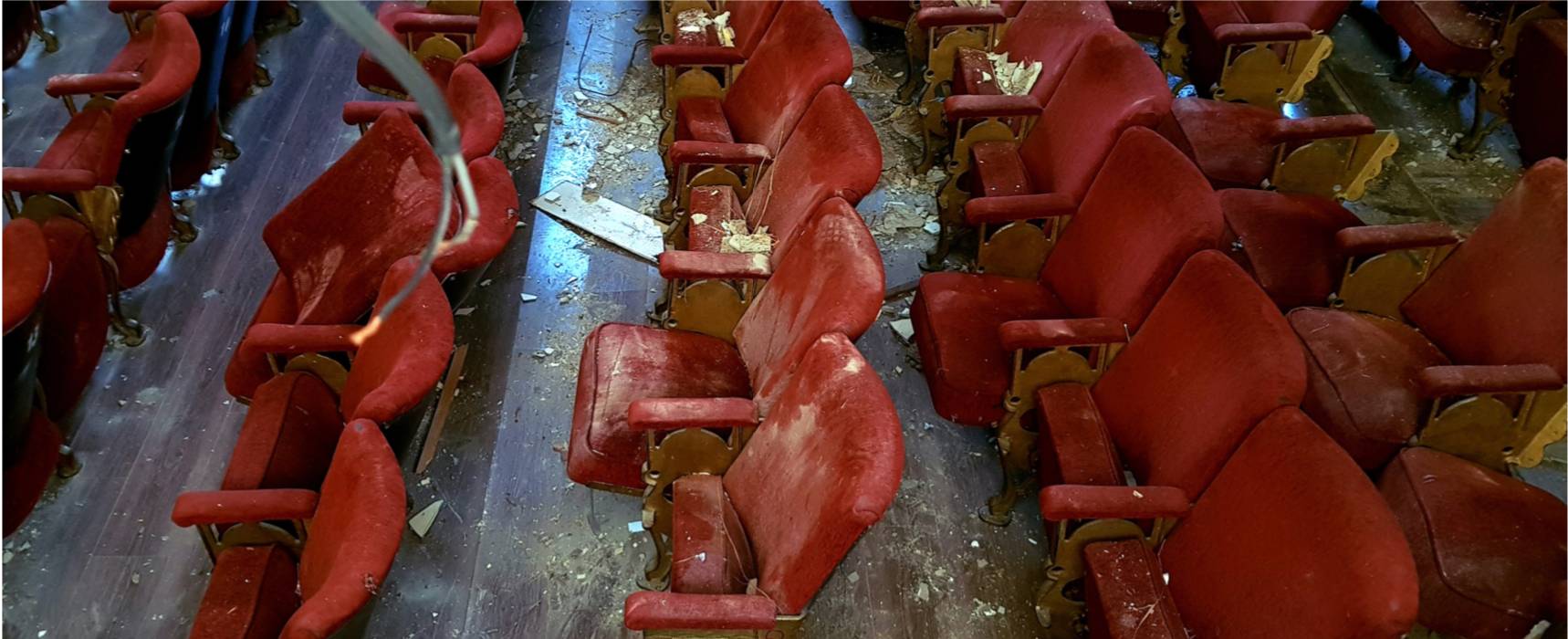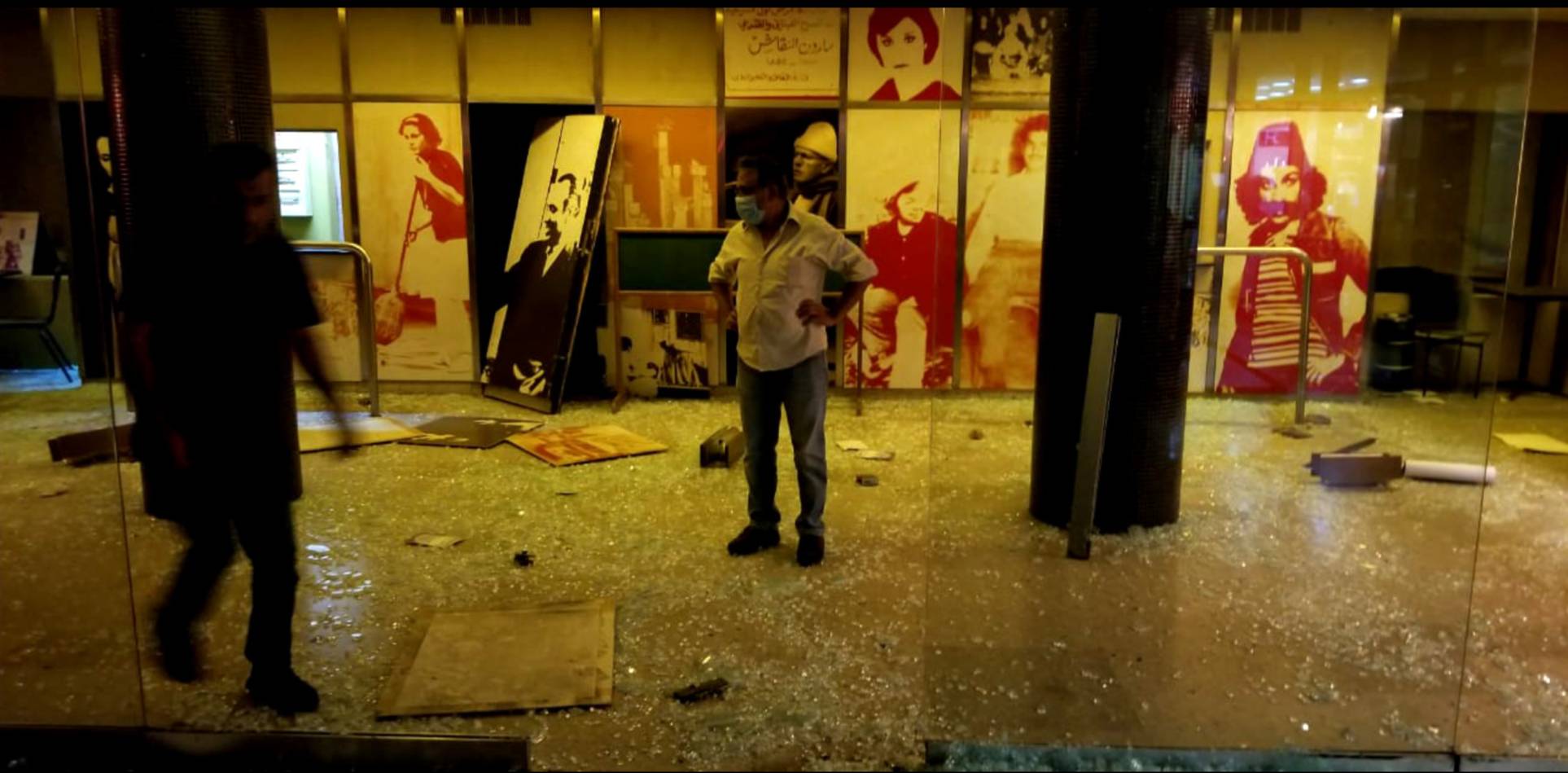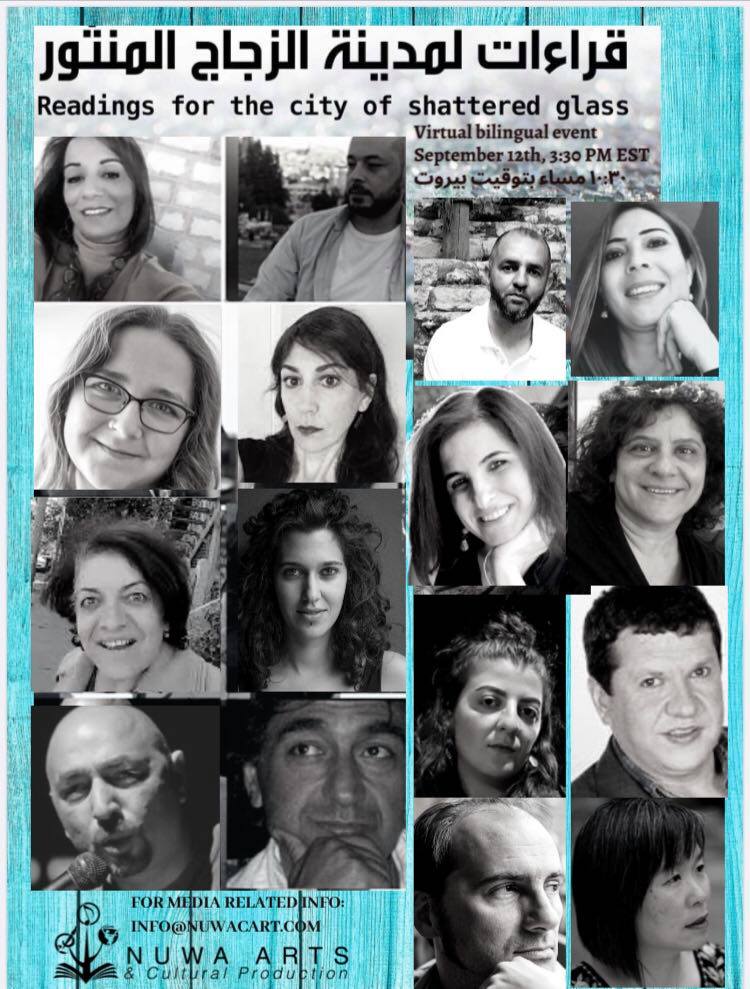“It is our particular role now to keep theater and theatermakers alive and dignified”:
By M Lynx Qualey
 More than a dozen poets, playwrights, novelists, actors, and storytellers will get together on Saturday, September 12 to perform their work in a benefit for Lebanon’s theater community. None of the organizers were in Beirut on August 4, when a massive explosion killed more than 170 people, injured 6,000, and displaced more than 300,000. However, they write, “The explosion was so intense, that we felt it came out of our smart screens in Baalbek, Ottawa, Ramallah, Arizona, Sweden, Iraq and Jerusalem, that it had shattered us together with everyone and everything else.”
More than a dozen poets, playwrights, novelists, actors, and storytellers will get together on Saturday, September 12 to perform their work in a benefit for Lebanon’s theater community. None of the organizers were in Beirut on August 4, when a massive explosion killed more than 170 people, injured 6,000, and displaced more than 300,000. However, they write, “The explosion was so intense, that we felt it came out of our smart screens in Baalbek, Ottawa, Ramallah, Arizona, Sweden, Iraq and Jerusalem, that it had shattered us together with everyone and everything else.”
In response, they have put together “The City of Shattered Glass,” a two-hour virtual reading organized by The Writing Time writers and Nuwa Arts and Cultural Production. Authors and theatre artists will read or perform short works, some of which were written in response to the August 4 explosion.
Tickets are $10 — although event-goers can donate more — and proceeds will go to the Theater Relief Group in Lebanon, a group of more than one hundred independent theater practitioners in Lebanon who came together after the explosion with the aim of providing “support to individuals and theatrical spaces damaged by the bombing,” a community that was already struggling with Covid-19 shutdowns and the collapse of Lebanon’s economy.
Readers at “The City of Shattered Glass” event are scheduled to include acclaimed authors and performers: poet and critic Abdo Wazen; novelist are short-story writer Bassam Jamil, novelist and short-story writer Khalil Nassif, storyteller Denise Assaad, novelist and short-story writer Sonia Khader, short-story writer Hisham Bustani, poet Asmaa Azaizeh, poet Jassim Mohammed, novelist Basima Takrouri, novelist Larissa Lai, poet Nyla Matuk, poet Nina Jane Drystek, artist and poet Christina Hajjar, actor and director Aida Sabra, poet David O’Meara, and writer, theatre-maker, and academic Mona Merhi.
In addition to “The City of Shattered Glass,” the Theater Relief Group is also running a performance called “Beirut, No Show Tonight” — a performance that will not take place. They write: “It will not happen. It cannot happen. There is no story here, only devastation.” People are invited to make a donation by purchasing a “pay-what-you want” ticket.
Mona Merhi, who is part of the Theater Relief Group in Lebanon, and Director of Nuwa Arts and Cultural Production Basima Takrouri answered a few questions about tomorrow’s event, which will be 3:30 p.m. EST, 8:30 p.m. BST, 10:30 p.m. in Lebanon.
What role do you see theater playing during times of crisis?
Mona Merhi: In general terms, theater has thrived or witnessed marking moments throughout history in moments of crisis. Some studies show that the plague resulted in the creation of pantomime as a genre in 364 BCE, when it was adopted by the Romans to please the gods. Some might argue this fact; however, if one examines the long historical path of theatre over 2500 years, we would find many examples when critical historical or political eras were concomitant with marking moments in the history of theater.
What is worth noting in Lebanon is that “times of crisis” is our daily routine. A state of emergency became the intermittent pendulum of our existence. I don’t think that what we are in now could be seen as “a time of crisis.” We are in a post-apocalyptic era where all the atrocities are beyond one’s imagination. Lebanese citizens, Lebanese theater artists already experienced the descent to the underworld.
We are in such a critical situation that we are inverting the role of theater: instead of having that art form as a tool to reflect on society, to convey social order, to incite rebellion or revolution, and most of all justice in times of crisis, what we are striving for at the moment is to gather the dismantled pieces of a very vivid theatrical scene in Lebanon. It is our particular role now to keep theater and theatermakers alive and dignified.
Why is it important to support Beirut’s (and Lebanon’s) theater communities during this multilayered crisis (the economic and political crisis, Covid, the explosion)?

Photo courtesy: Theater Relief Group in Lebanon
MM: Almost all of the capital’s theater spaces and venues are damaged. Some of them are severely ruined, which might make it difficult for some spaces to survive that moment. More importantly, the areas close to the explosion — Gemmayzeh and Mar Mkhayel — are known to be a vibrant hub for all artists from different fields. Many theater-makers were severely injured and almost every citizen living in Beirut and its surroundings, was subject to the damage (whether material, physical, or psychological).
The title of our reading didn’t come out of nowhere: Beirut’s soil literally transformed into shattered glass. Another very important factor about the importance of supporting Beirut’s theater communities is that this comes in the aftermath of the multi-layered crisis: The explosion was the tip of the iceberg. What lays underneath and what was antecedent to the bombing is the inflation that led to a loss of the value of our local currency (the dollar’s exchange rate exceeded seven times its normal rate 10 months ago), citizens are not able to have access to their savings in the banks, irresponsible leaders, Covid-19, regional political reconfiguration of some states’ roles, etc. All these layers make any citizen in Lebanon vulnerable. However, theater-makers rely on their freelance work to sustain their living, and when we know that, since November, theater productions were decreasing enormously, the situation becomes more critical, which necessitates a specific attention to keep the sector and its people alive.
How does the Theater Relief Group in Lebanon hope to intervene in the short term and also change things for the longer term? (What needs to change in order to support accessible theater for all ages?)

Photo courtesy: Theater Relief Group in Lebanon
MM: We gathered as artists from different generations and from different parts of world to respond to the appalling explosion. What mattered and what still does until present moment is to constitute an immediate chain of solidarity to support actors, technicians, directors, and writers who were injured and whose houses were affected. We almost completed the first phase of our relief efforts, and we are preparing for the second phase. Our priority remains to respond to the explosion and the aftermath of the multi-layered political crisis and its financial implications. When it comes to longer-term hopes of change, we are learning on a daily basis from this grassroots initiative as a collective. There are lots of plans and ideas under discussion related to a healthier environment in the field. However, it is too early to decide on a specific long-term plan of change. We visualized many possibilities, but we prefer to let the coming days lead the way to any decision related to a longer-term process. At the moment, we are only focusing on phases one and two.
How can people apply, and who determines whether they get funds?
MM: We reached out to artists who were injured in two ways: online surveys and personal contacts (in-person meetings or virtual calls). We focused on a human approach where a one-to-one personal meeting is essential: Volunteer artists interviewed their fellow theater-makers while listening carefully to their stories, to their pain… The process is not only an application form that needs be filled or a survey with data. People are not data. Although facts, figures and numbers are important, what matters the most is to show artists that someone is here for them. As per the process of who gets the fund, there is a selection committee that reviews the findings of the interviewers while guaranteeing that the decision process is handled with extreme transparency.
Who is Nuwa, and what’s their relationship to the event?
Basima Takrouri: Nuwa is a Canadian Arab Artists network and nonprofit organization that I have founded in Ottawa, ON, mainly to promote the Arab literature and arts in Canada and to create channels for Arab artists to present and show their artistic and cultural production to an English-speaking audience.
The readings fundraiser event initially emerged as a spontaneous response from the writers participating in The Writing Time project, organized by Nuwa Arts, where the six of us — Sonia Khader, Denes Asa’d, Bassam Jamil, Khalil Nasif, Mona Merhi and myself — met virtually on daily bases for writing and discussion sessions, since mid-July. We noticed that our writings were drifting from their usual course in the aftermath of the explosion, feeling burdened with being far and not being able to physically support our friends and colleagues in Beirut. Thus, we decided to do what we do, to write and read. Some of the texts chosen to be read in the event were written during The Writing sessions that took place after the 4th of August. The reading in its current shape was designed as an artist-to-artist support and fundraiser event. Canadian and Arab writers from Nuwa Arts’ network across Canada and the Arab world and Europe were so enthusiastic and humble to accept Nuwa Arts’ call to join the Writing time team and read in support of Beirut.
Since Mona was already a coordinator in the Theater Relief Group in Lebanon, which launched the “No Show Tonight Fundraiser,” we decided to allocate all the proceeds for TRGL.
What texts will you be reading for the event?
 BT: We were fortunate in the generosity of all the writers, some of whom contacted us to be part of the readings. Most of the authors of “Time for Writing” will be reading texts that were greatly affected by the explosion. Award-winning Jordanian short-story writer Hisham Bustani will read “Voices within”, translated to English by Thoraya El-Rayyes.
BT: We were fortunate in the generosity of all the writers, some of whom contacted us to be part of the readings. Most of the authors of “Time for Writing” will be reading texts that were greatly affected by the explosion. Award-winning Jordanian short-story writer Hisham Bustani will read “Voices within”, translated to English by Thoraya El-Rayyes.
Other texts include: “Balcony” a short story by Palestinian Syrian Short story writer Bassam Jamil, translated into English by Alice Yousef, “The Ground Cracked” by Palestinian novelist Sonia Khader, translated into English by Basima Takrouri and Palestinian novelist Khalil Nassif’s “Weevil,” translated into English by Alice Yousef. These three texts reflect the last moments lived before the explosion in Beirut, a port worker, a hair salon employee, and a retired man, and their deferred lives.
Lebanese short story writer Mona Merhi, based in Washington, will read “Writing Until I Die,” with Mona’s English text edited by Nyla Matuk. Denise Asa’ad, a Palestinian storyteller based in Haifa, will be performing an old oral story, transmitted to her from her father, about love, sacrifices, and the closeness and bonds between seashore cities, namely Haifa and Beirut. Jassem Mohammad, an Iraqi Swedish writer based in Sweden, will read “In the Hands of Oblivion,” a touching text from his poetry collection “Witnesses to Meaningless Events.”
From her “Don’t Believe Me If I Talk to You of War,” Palestinian poet, Asmaa Azaizeh will be reading her text “Sacrificial poem,” from her home in Haifa.
In addition to reading their own texts, Canadian writers will read the English translation of Arabic texts read by Arabic-speaking poets and writers at the reading. The text I will be reading is called “Ascension Monastery,” a poem from my recent collection “Nettle Memories,” an attempt to restore language from distorted memories of children living on the verges of war and history. The readings also feature an intervention by eminent Lebanese artist and director Hanane Haj Ali, about the situation on the ground in Beirut and the Theater Relief Group Lebanon’s response. Aida Sbara, Lebanese theater actress and director, will join us from Montreal with a performed intervention tackling her story as an artist in reflection to the devastation.
Buy a ticket to the event or make a donation through Eventbrite.
Other upcoming fundraisers for our by Lebanon’s arts communities:
“Stand Up for Beirut” A comedy show for a great cause.
Maqam Beirut, the second concert in a four-part series for the Rebuild Beirut Benefit.
Click HERE to read more from this author.
You can publish this article on your website as long as you provide a link back to this page.

Be the first to comment